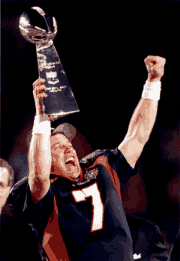Bucking the Trend

Think back...Further...Back to January of 1984, when the AFC champion LA Raiders beat the NFC's Washington Redskins 38-9 to win Super Bowl XVII. Magic and Larry were battling it out for the NBA Championship at the time, the U.S. had just invaded Grenada, The Police's “Every Breath You Take” (the original version) was filling up the airwaves, and break dancing had finally overtaken the Rubik's Cube as the hot new fad. Michael Jackson still had a nose, Prince still had a name, and the award for outstanding actor in a comedy series went to...(dramatic pause)...John Ritter for Three's Company. Yes, it was a long time ago.
Since that Raiders' victory, The NFC rattled off a mind-boggling 13 consecutive Super Bowl victories, outscoring the AFC 490-219, in an era of dominance by a conference unparalleled in any of the other three major sports.
Thanks to John Elway and the 1997-98 Denver Broncos, that era of dominance has come to an end. Elway's numbers in the Broncos' 31-24 win over the heavily-favored Green Bay Packers in Super Bowl XXXII were far from spectacular, a mere 123 yards passing on 12 completions. But the fire in his eyes and his “do whatever it takes” attitude was obvious, particularly on one eight-yard scramble late in the third quarter when he was spun around in midair by two defenders and dropped at the Packers' four-yard line. He clearly had no intentions of having the Broncos become the first team in history to be losers in five Super Bowls.
 Denver quarterback John Elway celebrates with the Vince Lombardi Trophy after leading the Broncos to a 31-24 upset win over the Green Bay Packers in Super Bowl XXXII in San Diego. Archive Photos |
Elway was on the field for three of the four losses. So what proved to be the difference this time around? Without question, the 1997-98 Broncos had something the other editions were lacking—a solid running game to go along with Elway's brilliance. Third-year running back Terrell Davis was immense throughout the regular season and playoffs, then capped the season off with the fifth-best rushing performance in Super Bowl history. Behind a relatively small but quick and experienced offensive line, Davis exploded for 157 yards on 30 carries. He crossed the goal line three times, tying a Super Bowl record, and was handed the game's MVP award for his efforts. And all of this he accomplished while fighting off chronic migraine headaches that he has suffered through for most of his life.
There was really no reason before the game to think that the Packers, 11-point favorites, wouldn't repeat as champions and run the NFC's streak to 14 years. They posted a 13-3 record for the second consecutive year, found a feature running back of their own in Dorsey Levens, and of course, still had the incomparable Brett Favre.
Favre once again led the NFL in touchdown passes with 35 and became the first player in NFL history to win three consecutive MVP awards. This year, however, he shared the title. And he shared it with one of football's most loved and respected players, Barry Sanders. Sanders was simply astounding for Detroit in 1997 as he became the third running back in history to rush for over 2,000 yards in one season, juking and jiving to 2,053 yards in 1997, a total second only to Eric Dickerson's 2,105 in 1984.
But while the 1997-98 season was one that may be remembered for Sanders' moves and class, or the emergence of Steelers' QB Kordell Stewart, or the ridiculously large TV contracts, among others, perhaps the most important mark was made by Elway, Davis, and the rest of the Broncos who beat the odds and started the AFC on what could be a new streak of their own. Right now, it's one in a row and counting.







